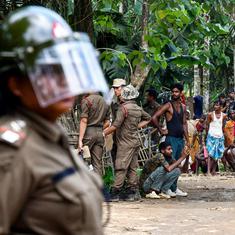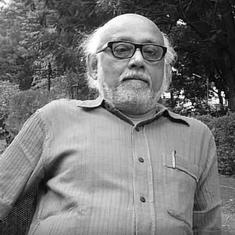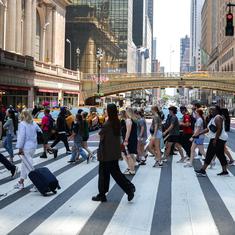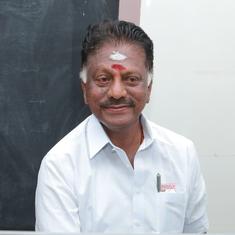In the twisted, bigoted reality of new India, it is normal for Hindu goons – accompanied by the police –to break into the home of a family of war veterans in the dead of the night, accuse them of being “Bangladeshi” or “Rohingya”, demand proof of citizenship and terrorise them. The police, instead of arresting the goons, round up the men of the family and take them to a police station, as the mob screams, “Jai Shri Ram!”
Finally, the men are freed, but the police register no cases against the goons.
It is normal for the industries minister in the state of Delhi to act on accusations that poor, mostly Muslim workers slaving in sweatshops were Bangladeshi or Rohingya “infiltrators” carrying on “jeans jihad”, a ludicrous accusation that leads to many factories being closed and hundreds losing jobs in a nation where millions are out of work.
It is normal for a government eviction drive – the latest this week of many – in Assam to bulldoze Muslim homes built under a prime ministerial housing scheme, connected to a national drinking-water project, where children attend government schools under a flagship education programme.
The accusation of being Bangladeshi or Rohingya is the latest dog whistle used to terrorise and threaten Muslims and cleanse entire areas of them. The three events I refer to were reported over the last few days but are no random acts.
Similar acts of intimidation and violence are coalescing nationwide, especially in states ruled by the Bharatiya Janata Party, into a blueprint, an agenda or a roadmap – all synonyms fit – to purge the notion that Muslims are equal citizens. Many go unreported, footnotes in the playbook that is India’s new normal.
#Assam | Residents who were evicted on Tuesday from the Bidyapur village in Golaghat claimed that the settlement was established under the patronage of the Assam government in the late 1970s in a contested area on the state’s border with Nagaland.https://t.co/1MTHl456I7… pic.twitter.com/HbfuNo0B8q
— Scroll.in (@scroll_in) July 30, 2025
Across India – Maharashtra, Uttar Pradesh, Haryana, Odisha, Rajasthan, Delhi, Gujarat – a crackdown is underway, targeting or terrorising Bengali Muslims under the guise of deporting “illegal Bangladeshi immigrants.” As the latest cases show, the Bengali-speaking filter, too, is being discarded to question or erase the political and social presence of all Muslims.
The official markers of identity and legality, such as Aadhar, PAN cards, voter IDs, are dismissed as fake or simply set aside, as false claims of national security and demographic imbalance proliferate.
This is what Himanta Biswa Sharma, the chief minister of Assam, posted recently in justification of demolitions: “Legally, all of them may not be foreigners. But we, the people of Assam – especially Hindus – are becoming a hopeless minority in our own land. All this has happened over a span of just 60 years. We have lost our culture, our land, our temples. The law gives us no remedy. That’s why we are desperate – not for revenge, but for survival.”
In no other state has the chronology of exclusion advanced as far as Assam, which has incubated and operationalised a systematic agenda of dispossession against Muslims: demolition, detention, disenfranchisement, deportation. With the state itself turning on them, thousands of Muslims have been left homeless and stateless, their children out of school, their livelihoods and assets wiped out.
Scroll’s Rokibuz Zaman has meticulously chronicled Assam’s long descent into darkness.
Assam: Ground Zero
Last week, a new report from the National Law School of India University and the Queen Mary University of London described how Assam’s quasi-judicial Foreigners’ Tribunals, supported by the Gauhati High Court, have stripped thousands of citizenship, ignoring India’s legal procedures and Supreme Court orders.
A study of 1,200 High Court orders, the report was put together by Article 14 editorial board member and law professor Mohsin Alam Bhat and colleagues Arushi Gupta and Shardul Gopujkar. “Future generations of Indians will be ashamed, appalled and enraged by this systematic cruelty being perpetrated in the name of their safety and security,” wrote Tarunabh Khaitan, professor and chair of public law at the London School of Economics Law School, in an endorsement of the report.
In 2017, I travelled to Assam to write this investigation into the lives disrupted and families torn apart in the state’s citizenship trials. They were then cloaked in a veneer of legalese and legitimised as an exercise overseen by the Supreme Court. The poorest, usually those without adequate documentation, were the most obvious victims.
Many Hindu migrants, too, were swept into the net, but the net was methodically adjusted over the years in such a way that mainly Muslims remain. (It is not out of the bounds of imagination if a similar disenfranchisement occurs in Bihar, where 6.5 million voters have been excluded, from a dodgy, last-minute revision of voter rolls, with plans now being made for other states).
“We’re in the NRC since 1951. My father & grandfather were too. How are we Bangladeshis?”
— Article 14 (@Article14live) July 25, 2025
Shahid Ali, 56, resident of Hasila Beel, #Assam, to @arshadreports @KaziNeel1
Despite citizenship proof, 600+ Bengali-speaking Muslims termed “illegal encroachers” & evicted on 16 June… pic.twitter.com/ighQJtpChg
The broader implications of the Assam blueprint are becoming ever clearer, as the dots are joined, and the exclusionary tactics are replicated in India’s unfolding Kristallnacht.
“India’s ruling BJP is fuelling discrimination by arbitrarily expelling Bengali Muslims from the country, including Indian citizens,” Elaine Pearson, Asia director at Human Rights Watch, a global advocacy group, was quoted as saying in a new report released on July 25. “The government is putting thousands of vulnerable people at risk in apparent pursuit of unauthorised immigrants, but their actions reflect broader discriminatory policies against Muslims.”
Assam to Everywhere
As it spreads across India, Assam’s discriminatory template of excuses driven by disinformation has evolved.
In Maharashtra, the police arrest Bengali-speaking Muslims, ignore their documentation and truck them to the Bangladesh border where border guards force them across – some at gunpoint. In Uttar Pradesh, Hindu goons raid the homes of Muslim travelling salesmen from West Bengal, claiming they were illegal immigrants. Police turn on the victims, sweeping up dozens in arbitrary detentions.
Some have been retrieved after court orders, public outrage, and intervention by West Bengal police –but many more have disappeared.
Even minor markers – like a Bangladeshi phone number – are used as pretext for deportation. No magistrates, charges, or hearings are involved. Just untraceable “pushbacks”: a practice where the Border Security Force forcibly walks the accused person across unguarded stretches of the Bangladesh border.
In India’s National Capital Region, the industrial scale of detentions – entire shanty towns of Bengali-speaking Muslims emptied out – came to national attention not because of their arbitrary nature but because they caused a garbage crisis and flight of domestic staff, affecting those who occupy the shiny towers and gated communities of Gurugram, home to multinational and Indian corporations.
That, not the injustice, made headlines (here and here).
"Linguistic identity is being used to harass Bengalis," @MahuaMoitra tells me, commenting on the spate of migrant workers from West Bengal picked up and accused of being "Bangladeshi". pic.twitter.com/4TvBGYUyLW
— shoaib daniyal (@ShoaibDaniyal) July 27, 2025
No laws required
The blueprint of exclusion includes steadily diverging paths for Hindus and Muslims. The state now openly supports Hindu religious festivals and pilgrimages, while in many northern states, Muslim prayer in public is often criminalised.
Muslim food habits, commerce, dress, love lives – all are fair game. “Justice” is now visibly bifurcated: one law for Hindus, another for Muslims, as my colleague Kashif Kakvi reported in the case of Hindu and Muslims suspected of cow slaughter in BJP-run Madhya Pradesh.
In Ujjain and Damoh, Muslims accused of trafficking cows were publicly shamed, flogged, paraded and forced to chant slogans that went, “cow is our mother” and “police are our father”. In Chhindwara, Hindu suspects were arrested without public spectacle or much media attention, while in Congress-run Damoh, Muslim homes were demolished.
Demolitions once required court orders. Now, bulldozers are routinely used as political tools of retribution. Even a November 2024 Supreme Court order to stop random demolitions has not significantly slowed the pace, largely because of a legal escape hatch. The court said protection would not apply to “unauthorised structures in any public place such as road, street, footpath, abutting railway line or any river body or water bodies” nor to demolitions explicitly ordered by a court.
The BJP has not hidden its intentions. Home Minister Amit Shah has called Bangladeshi migrants “termites”. Prime Minister Narendra Modi has said protesters could be “identified by their clothes”. His lieutenants dispense with even that fig leaf. In Uttarakhand, Muslim homes have been marked with black crosses, their homes bulldozed on fake pretexts, while the chief minister blames them for “land jihad” and “population imbalance”.
The chronology
The agenda for exclusion hews to a sequence: strip Muslims of protections, paper over the legal process, and punish citizenship itself. As the home minister Shah said in 2020, in a related context, “aap chronology samjhiye”, you understand the chronology.
The BJP has fused state violence with street vigilantism, weaponised the bureaucracy and embedded discrimination into the institutions of justice, media and governance.
The legacy media obediently play along, villainising Muslims during Covid, ignoring hate speech, celebrating bulldozers. Only recently, the Delhi High Court dismissed 16 cases against Muslims falsely accused of infecting others during the pandemic. That correction barely registered.
The steady hum of Islamophobia is reinforced every day by troll armies, TV anchors, politicians and the justice system. The result is an atmosphere in which the extraordinary becomes ordinary, the abnormal, normal.
Assam makes it clear where this path leads. It is as much warning, as it is roadmap.
A version of this column was first published in Article 14, of which Samar Halarnkar is the founding editor.










